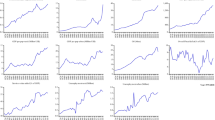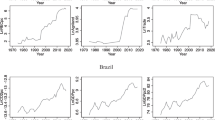Abstract
The accelerated urbanization in China was already coupled with a steadily increasing demand for energy usage. The present study major aim was to determine the asymmetric influence of urbanization, energy utilization, fossil fuel energy and CO2 emission on economic progress in China by using an annual time series data varies from 1975 to 2017. Stationarity amid variables was verified by applying the unit root tests, while non-linear autoregressive distributed lag (NARDL) bounds testing model was used to examine the asymmetric impacts on variables with short- and long-run dynamics. Outcomes revealed that via short-run estimates, the negative shocks of energy usage cause significantly to increase the economic efficiency, but positive shocks of energy utilization display the adverse linkage with the economic progress. Similarly, the negative shocks of GDP per capita growth demonstrate a substantial upsurge in the economic progress, and the positive shocks establish the adverse influence towards economic growth. Further, the outcomes of short-run dynamics also exposed the negative shocks of urbanization significantly affected the economic growth, but positive shocks exposed the adversative influence on economic growth. The outcomes display that fossil fuel energy consumption showed a constructive impact to economic progress, and additionally, the variable CO2 emission also uncovered a positive shocks having significant impact on economic progress. Furthermore, the outcomes of long-run analysis express that energy utilization has negative and positive shocks that expose the adverse influence on economic progress of China. GDP per capita growth exposed the constructive influence on the economic growth in both shocks. The negative and positive shocks of urbanization demonstrate a noteworthy influence on economic growth. The variable fossil fuel energy consumption also exposed an optimistic influence on economic progress, and finally the influence of CO2 emission on economic growth is insignificant as the results exposed. The reducing carbon alteration target aims to be reached for China, and in the next several decades, it will encourage the green energy options in order to decrease carbon dioxide emission to avoid environmental pollution by raising its energy intensity.





Similar content being viewed by others
Data availability
Not applicable.
References
Ahmad M, Zhao ZY, Rehman A, Shahzad M, Li H (2019) Revealing long-and short-run empirical interactions among foreign direct investment, renewable power generation, and CO 2 emissions in China. Environmental Science and Pollution Research 26(22):22220–22245
Ahmad M, Zhao ZY, Irfan M, Mukeshimana MC, Rehman A, Jabeen G, Li H (2020a) Modeling heterogeneous dynamic interactions among energy investment, SO 2 emissions and economic performance in regional China. Environmental Science and Pollution Research 27(3):2730–2744
Ahmad M, Ahmed N, Jabeen M, Jabeen G, Qamar S, Chandio AA, Rehman A, Rauf A (2020b) Empirics on heterogeneous links among urbanization, the intensity of electric power consumption, water-based emissions, and economic progress in regional China. Environmental Science and Pollution Research 27(31):38937–38950
Ahmad M, Li H, Anser MK, Rehman A, Fareed Z, Yan Q, Jabeen G (2020c) Are the intensity of energy use, land agglomeration, CO2 emissions, and economic progress dynamically interlinked across development levels? Energy & Environment:0958305X20949471
Alimohammadlou Y, Najafi A, Yalcin A (2013) Landslide process and impacts: a proposed classification method. Catena 104:219–232
Al-Mulali U, Ozturk I, Lean HH (2015) The influence of economic growth, urbanization, trade openness, financial development, and renewable energy on pollution in Europe. Natural Hazards 79(1):621–644
Alsayed AR, Isa Z, Kun SS, Manzi G (2020) Quantile regression to tackle the heterogeneity on the relationship between economic growth, energy consumption, and CO 2 emissions. Environmental Modeling & Assessment 25(2):251–258
Antonakakis N, Chatziantoniou I, Filis G (2017) Energy consumption, CO2 emissions, and economic growth: an ethical dilemma. Renewable and Sustainable Energy Reviews 68:808–824
Apergis N, Payne JE (2010) Renewable energy consumption and growth in Eurasia. Energy Economics 32(6):1392–1397
Arouri MEH, Youssef AB, M'henni H, Rault C (2012) Energy consumption, economic growth and CO2 emissions in Middle East and North African countries. Energy policy 45:342–349
Azam M, Khan AQ, Ozturk I (2019) The effects of energy on investment, human health, environment and economic growth: empirical evidence from China. Environmental Science and Pollution Research 26(11):10816–10825
Bakirtas T, Akpolat AG (2018) The relationship between energy consumption, urbanization, and economic growth in new emerging-market countries. Energy 147:110–121
Bao C, Chen X (2017) Spatial econometric analysis on influencing factors of water consumption efficiency in urbanizing China. Journal of Geographical Sciences 27(12):1450–1462
Bhattacharya M, Paramati SR, Ozturk I, Bhattacharya S (2016) The effect of renewable energy consumption on economic growth: Evidence from top 38 countries. Applied Energy 162:733–741
Bildirici M (2016) Defense, economic growth and energy consumption in China. Procedia Economics and Finance 38(1):257–263
Bloch H, Rafiq S, Salim R (2015) Economic growth with coal, oil and renewable energy consumption in China: prospects for fuel substitution. Economic Modelling 44:104–115
Bozzelli LJ (2019) Urbanization and population growth: projected impacts of growth on ecological resources in Ontario1. International Research Scape Journal 6(1):2
Cai Y, Sam CY, Chang T (2018) Nexus between clean energy consumption, economic growth and CO2 emissions. Journal of Cleaner Production 182:1001–1011
Chen M, Liu W, Tao X (2013) Evolution and assessment on China’s urbanization 1960–2010: under-urbanization or over-urbanization? Habitat International 38:25–33
Chen M, Zhang H, Liu W, Zhang W (2014) The global pattern of urbanization and economic growth: evidence from the last three decades. PloS one 9(8):e103799
Chen Y, Wang Z, Zhong Z (2019) CO2 emissions, economic growth, renewable and non-renewable energy production and foreign trade in China. Renewable energy 131:208–216
Cucchiella F, D'Adamo I, Gastaldi M, Miliacca M (2018) Efficiency and allocation of emission allowances and energy consumption over more sustainable European economies. Journal of Cleaner Production 182:805–817
de Espindola GM, da Costa Carneiro ELN, Façanha AC (2017) Four decades of urban sprawl and population growth in Teresina, Brazil. Applied Geography 79:73–83
Destek MA, Aslan A (2017) Renewable and non-renewable energy consumption and economic growth in emerging economies: evidence from bootstrap panel causality. Renewable Energy 111:757–763
Dickey DA, Fuller WA (1979) Distribution of the estimators for autoregressive time series with a unit root. Journal of the American statistical association 74:427–431
Duan L, Wei M (2017) Study on the rationality of land finance mode under the background of new urbanization. Urban Development Studies 2:22
Ehigiamusoe KU, Lean HH (2019) Effects of energy consumption, economic growth, and financial development on carbon emissions: evidence from heterogeneous income groups. Environmental Science and Pollution Research 26(22):22611–22624
Fang C, Ren Y (2017) Analysis of energy-based metabolic efficiency and environmental pressure on the local coupling and telecoupling between urbanization and the eco-environment in the Beijing-Tianjin-Hebei urban agglomeration. Science China Earth Sciences 60(6):1083–1097
Heidari H, Katircioğlu ST, Saeidpour L (2015) Economic growth, CO2 emissions, and energy consumption in the five ASEAN countries. International Journal of Electrical Power & Energy Systems 64:785–791
Huang Z, Huang L (2019) Individual new energy consumption and economic growth in China. The North American Journal of Economics and Finance 101010
Iodice P, Senatore A (2016) Atmospheric pollution from point and diffuse sources in a National Interest Priority Site located in Italy. Energy & Environment 27(5):586–596
Johansen S, Juselius K (1990) Maximum likelihood estimation and inference on cointegration—with applications to the demand for money. Oxford Bulletin of Economics and Statistics 52:169–210
Kahia M, Aïssa MSB, Charfeddine L (2016) Impact of renewable and non-renewable energy consumption on economic growth: new evidence from the MENA Net Oil Exporting Countries (NOECs). Energy 116:102–115
Kahia M, Aïssa MSB, Lanouar C (2017) Renewable and non-renewable energy use-economic growth nexus: the case of MENA Net Oil Importing Countries. Renewable and Sustainable Energy Reviews 71:127–140
Kardooni R, Yusoff SB, Kari FB (2015) Barriers to renewable energy development: five fuel policy in Malaysia. Energy & Environment 26(8):1353–1361
Kaur RR, Luthra A (2018) Population growth, urbanization and electricity-challenges and initiatives in the state of Punjab, India. Energy strategy reviews 21:50–61
Khobai H, Le Roux P (2017) The relationship between energy consumption, economic growth and carbon dioxide emission: the case of South Africa. International Journal of Energy Economics and Policy 7(3):102–109
Koçak E, Şarkgüneşi A (2017) The renewable energy and economic growth nexus in Black Sea and Balkan countries. Energy Policy 100:51–57
Kwiatkowski D, Phillips PC, Schmidt P, Shin Y (1992) Testing the null hypothesis of stationarity against the alternative of a unit root. Journal of econometrics 54:159–178
Lei W, Xinshu G (2014) Urbanization, industrial ecologicalization and economic growth——an empirical research based on northwestern five provinces’ panel data. In Forum on Science and Technology in China (No. 3, p. 17).
Liang W, Yang M (2019) Urbanization, economic growth and environmental pollution: Evidence from China. Sustainable Computing: Informatics and Systems 21:1–9
Lin B, Ahmad I (2017) Analysis of energy related carbon dioxide emission and reduction potential in Pakistan. Journal of Cleaner Production 143:278–287
Liu Y, Xiao H, Zikhali P, Lv Y (2014) Carbon emissions in China: a spatial econometric analysis at the regional level. Sustainability 6(9):6005–6023
Liu S, Zhu Y, Du K (2017) The impact of industrial agglomeration on industrial pollutant emission: evidence from China under New Normal. Clean Technologies and Environmental Policy 19(9):2327–2334
Lu WC (2018) The impacts of information and communication technology, energy consumption, financial development, and economic growth on carbon dioxide emissions in 12 Asian countries. Mitigation and Adaptation Strategies for Global Change 23(8):1351–1365
Narayan L (2016) Relationship between urbanisation and economic growth: a causality analysis for India. Indian Journal of Economics and Development 12(2):237–242
Nathaniel SP (2020) Ecological footprint, energy use, trade, and urbanization linkage in Indonesia. Geo Journal:1–14. https://doi.org/10.1007/s10708-020-10175-7
Nguyen HM (2018) The relationship between urbanization and economic growth. International Journal of Social Economics 45:316–339
Ozcan B, Ozturk I (2019) Renewable energy consumption-economic growth nexus in emerging countries: a bootstrap panel causality test. Renewable and Sustainable Energy Reviews 104:30–37
Paula AJ, Hwang G, Koo H (2020) Dynamics of bacterial population growth in biofilms resemble spatial and structural aspects of urbanization. Nature communications 11(1):1–14
Pesaran MH, Shin Y, Smith RJ (2001) Bounds testing approaches to the analysis of level relationships. Journal of applied econometrics 16:289–326
Phillips PC, Perron P (1988) Testing for a unit root in time series regression. Biometrika 75:335–346
Raggad B (2018) Carbon dioxide emissions, economic growth, energy use, and urbanization in Saudi Arabia: evidence from the ARDL approach and impulse saturation break tests. Environmental Science and Pollution Research 25(15):14882–14898
Rasoulinezhad E, Saboori B (2018) Panel estimation for renewable and non-renewable energy consumption, economic growth, CO2 emissions, the composite trade intensity, and financial openness of the commonwealth of independent states. Environmental Science and Pollution Research 25(18):17354–17370
Rehman A, Rauf A, Ahmad M, Chandio AA, Deyuan Z (2019) The effect of carbon dioxide emission and the consumption of electrical energy, fossil fuel energy, and renewable energy, on economic performance: evidence from Pakistan. Environmental Science and Pollution Research 26(21):21760–21773
Rehman A, Ma H, Irfan M, Ahmad M (2020a) Does carbon dioxide, methane, nitrous oxide, and GHG emissions influence the agriculture? Evidence from China. Environmental Science and Pollution Research 27:28768–28779
Rehman A, Ma H, Ozturk I (2020b) Decoupling the climatic and carbon dioxide emission influence to maize crop production in Pakistan. Air Quality, Atmosphere & Health 13:695–707
Sarkar R (2019) Association of urbanisation with demographic dynamics in India. Geo Journal 85:1–25. https://doi.org/10.1007/s10708-019-09988-y
Sbia R, Shahbaz M, Hamdi H (2014) A contribution of foreign direct investment, clean energy, trade openness, carbon emissions and economic growth to energy demand in UAE. Economic modelling 36:191–197
Shin Y, Yu B, Greenwood-Nimmo M (2014) Modelling asymmetric cointegration and dynamic multipliers in a nonlinear ARDL framework. In Festschrift in honor of Peter Schmidt. Springer, New York, NY, pp 281–314. https://doi.org/10.1007/978-1-4899-8008-3_9
Sohag K, Taşkın FD, Malik MN (2019) Green economic growth, cleaner energy and militarization: evidence from Turkey. Resources Policy 63:101407
Srinivasan P, Ravindra IS (2015) Causality among energy consumption, CO2 emission, economic growth and trade: a case of India. Foreign Trade Review 50(3):168–189
Su W, Liu Y, Wang S, Zhao Y, Su Y, Li S (2018) Regional inequality, spatial spillover effects, and the factors influencing city-level energy-related carbon emissions in China. Journal of Geographical Sciences 28(4):495–513
Sun J, Wang J, Wang T, Zhang T (2019) Urbanization, economic growth, and environmental pollution. Management of Environmental Quality: An International Journal 30:483–494
Tang CF, Tan BW (2014) The linkages among energy consumption, economic growth, relative price, foreign direct investment, and financial development in Malaysia. Quality & Quantity 48(2):781–797
Turok I, McGranahan G (2013) Urbanization and economic growth: the arguments and evidence for Africa and Asia. Environment and Urbanization 25(2):465–482
Udara Willhelm Abeydeera LH, Wadu Mesthrige J, Samarasinghalage TI (2019) Global research on carbon emissions: a scientometric review. Sustainability 11(14):3972
Valadkhani A, Smyth R, Nguyen J (2019) Effects of primary energy consumption on CO2 emissions under optimal thresholds: evidence from sixty countries over the last half century. Energy Economics 80:680–690
Wang Z, Feng C (2015) A performance evaluation of the energy, environmental, and economic efficiency and productivity in China: an application of global data envelopment analysis. Applied Energy 147:617–626
Wang S, Liu X (2017) China’s city-level energy-related CO2 emissions: spatiotemporal patterns and driving forces. Applied energy 200:204–214
Wang S, Fang C, Ma H, Wang Y, Qin J (2014) Spatial differences and multi-mechanism of carbon footprint based on GWR model in provincial China. Journal of Geographical Sciences 24(4):612–630
Wang S, Li Q, Fang C, Zhou C (2016a) The relationship between economic growth, energy consumption, and CO2 emissions: empirical evidence from China. Science of the Total Environment 542:360–371
Wang Q, Zeng YE, Wu BW (2016b) Exploring the relationship between urbanization, energy consumption, and CO2 emissions in different provinces of China. Renewable and sustainable energy reviews 54:1563–1579
Wang Y, Xiao W, Wang Y, Zhao Y, Wang J, Hou B, Song X, Zhang X (2018) Impact of China’s urbanization on water use and energy consumption: an econometric method and spatiotemporal analysis. Water 10(10):1323
Wang S, Li C, Zhou H (2019) Impact of China’s economic growth and energy consumption structure on atmospheric pollutants: based on a panel threshold model. Journal of Cleaner Production 236:117694
Wolde-Rufael Y, Menyah K (2010) Nuclear energy consumption and economic growth in nine developed countries. Energy economics 32(3):550–556
Wu HM (2020) The impact of non-clean energy consumption on economic growth: evidence from symmetric and asymmetric analyses in the US. Energy & Environment 31(2):291–307
Xu SC, He ZX, Long RY, Shen WX, Ji SB, Chen QB (2016) Impacts of economic growth and urbanization on CO2 emissions: regional differences in China based on panel estimation. Regional Environmental Change 16(3):777–787
Yang Y, Liu J, Zhang Y (2017) An analysis of the implications of China’s urbanization policy for economic growth and energy consumption. Journal of Cleaner Production 161:1251–1262
Zhao Y, Wang S (2015) The relationship between urbanization, economic growth and energy consumption in China: an econometric perspective analysis. Sustainability 7(5):5609–5627
Zheng W, Walsh PP (2019) Economic growth, urbanization and energy consumption—a provincial level analysis of China. Energy Economics 80:153–162
Author information
Authors and Affiliations
Contributions
Abdul Rehman: Conceptualization, investigation, methodology, formal analysis, visualization and writing the original draft. Hengyun Ma, Muhammad Zubair Chishti and Ilhan Ozturk: investigation, visualization and review and editing. Muhammad Irfan and Munir Ahmad: review, editing and made suggestions of the manuscript.
Corresponding author
Ethics declarations
Competing interests
The authors declare that they have no competing interests.
Ethics approval and consent to participate
Not applicable.
Consent for publication
Not applicable.
Additional information
Responsible Editor: Philippe Garrigues
Publisher’s note
Springer Nature remains neutral with regard to jurisdictional claims in published maps and institutional affiliations.
Rights and permissions
About this article
Cite this article
Rehman, A., Ma, H., Chishti, M.Z. et al. Asymmetric investigation to track the effect of urbanization, energy utilization, fossil fuel energy and CO2 emission on economic efficiency in China: another outlook. Environ Sci Pollut Res 28, 17319–17330 (2021). https://doi.org/10.1007/s11356-020-12186-w
Received:
Accepted:
Published:
Issue Date:
DOI: https://doi.org/10.1007/s11356-020-12186-w




